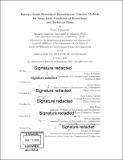| dc.contributor.advisor | Jaime Peraire and Ngoc-Cuong Nguyen. | en_US |
| dc.contributor.author | Fernández, Pablo. | en_US |
| dc.contributor.other | Massachusetts Institute of Technology. Department of Aeronautics and Astronautics. | en_US |
| dc.date.accessioned | 2019-10-11T21:53:13Z | |
| dc.date.available | 2019-10-11T21:53:13Z | |
| dc.date.copyright | 2019 | en_US |
| dc.date.issued | 2019 | en_US |
| dc.identifier.uri | https://hdl.handle.net/1721.1/122496 | |
| dc.description | Thesis: Ph. D. in Computational Science and Engineering, Massachusetts Institute of Technology, Department of Aeronautics and Astronautics, 2019 | en_US |
| dc.description | Cataloged from PDF version of thesis. | en_US |
| dc.description | Includes bibliographical references (pages 109-212). | en_US |
| dc.description.abstract | The use of computational fluid dynamics (CFD) in the aerospace industry is limited by the inability to accurately and reliably predict complex transitional and turbulent flows. This has become a major barrier to further reduce the costs, times and risks in the design process, further optimize designs, and further reduce fuel consumption and toxic emissions. Large-eddy simulation (LES) is currently the most promising simulation technique to accurately predict transitional and turbulent flows. LES, however, remains computationally expensive and often suffers from accuracy and robustness issues to the extent that it is still not practical for most applications of interest. In this thesis, we develop a series of methods and techniques to improve efficiency, accuracy and robustness of large-eddy simulations with the goal of making CFD a more powerful tool in the aerospace industry. | en_US |
| dc.description.abstract | First, we introduce a new class of high-order discretization schemes for the Euler and Navier-Stokes equations, referred to as the entropy-stable hybridized discontinuous Galerkin (DG) methods. As hybridized methods, they are amenable to static condensation and hence to more efficient implementations than standard DG methods. As entropy-stable methods, they are superior to conventional (non-entropy stable) methods for LES of compressible flows in terms of stability, robustness and accuracy. Second, we develop parallel iterative methods to efficiently and scalably solve the nonlinear system of equations arising from the discretization. The combination of hybridized DG methods with the proposed solution method provides excellent parallel scalability up to petascale and, for moderately high accuracy orders, leads to about one order of magnitude speedup with respect to standard DG methods. | en_US |
| dc.description.abstract | Third, we introduced a non-modal analysis theory that characterizes the numerical dissipation of high-order discretization schemes, including hybridized DG methods. Non-modal analysis provides critical guidelines on how to define the polynomial approximation space and the Riemann solver to improve accuracy and robustness in LES. Forth, we investigate how to best account for the effect of the subgrid scales (SGS) that, by definition, exist in LES. Numerical and theoretical results show the Riemann solver in the DG scheme plays the role of an implicit SGS model. More importantly, a change in the current best practices for SGS modeling is required in the context of high-order DG methods. And fifth, we present a physics-based shock capturing method for LES of high-Mach-number and high-Reynolds-number flows. The shock capturing method performs robustly from transonic to hypersonic regimes, provides sharp shock profiles, and has a small impact on the resolved turbulent structures. | en_US |
| dc.description.abstract | These are all critical ingredients to advance the state-of-the-art of high-order methods for LES, both in terms of methodology and understanding the relationship between the physics and the numerics. | en_US |
| dc.description.statementofresponsibility | by Pablo Fernández. | en_US |
| dc.format.extent | 212 pages | en_US |
| dc.language.iso | eng | en_US |
| dc.publisher | Massachusetts Institute of Technology | en_US |
| dc.rights | MIT theses are protected by copyright. They may be viewed, downloaded, or printed from this source but further reproduction or distribution in any format is prohibited without written permission. | en_US |
| dc.rights.uri | http://dspace.mit.edu/handle/1721.1/7582 | en_US |
| dc.subject | Aeronautics and Astronautics. | en_US |
| dc.title | Entropy-stable hybridized discontinuous Galerkin methods for large-eddy simulation of transitional and turbulent flows | en_US |
| dc.type | Thesis | en_US |
| dc.description.degree | Ph. D. in Computational Science and Engineering | en_US |
| dc.contributor.department | Massachusetts Institute of Technology. Department of Aeronautics and Astronautics | en_US |
| dc.identifier.oclc | 1121182149 | en_US |
| dc.description.collection | Ph.D.inComputationalScienceandEngineering Massachusetts Institute of Technology, Department of Aeronautics and Astronautics | en_US |
| dspace.imported | 2019-10-11T21:53:12Z | en_US |
| mit.thesis.degree | Doctoral | en_US |
| mit.thesis.department | Aero | en_US |
